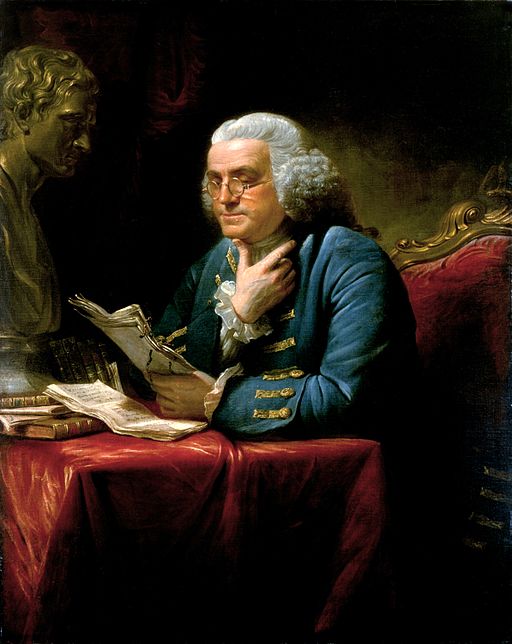| Hey, Remember how we spoke about deliberate practice a couple of weeks ago? Benjamin Franklin was one of the greatest minds in history. He was a prolific writer, inventor, entrepreneur, and statesman. He excelled at nearly everything he wanted to master. 
—David Martin, Public domain, via Wikimedia Commons
Except for chess. He was an average chess player despite practicing it for over 5 decades. Why? Franklin's approach to chess was to simply play. And playing is not deliberate practice because it doesn't meet the 5 criteria we discussed in our email to you last week. To become a chess grandmaster, the greats didn't simply play lots of chess games; they would recreate the boards of famous games and then make their best move. They would then check if their move matched that of the grandmaster. If it did, they'd go on to the next move. If they didn't make the same move as the grandmaster, they'd evaluate why they didn't make the "perfect" move. THAT is how you become a chess grandmaster. So, although Franklin was an average chess player, he did manage to become a world-class writer using a strategy similar to our online courses. Franklin found the writing of The Spectator to be some of the best and so set out to write as well as its authors. He would read articles and take just enough notes to recall the key points. He would then wait until he forgot the exact wording of the articles and rewrite them. Line-by-line, he would see where he matched or differed from the originals. While doing this, he realized that he couldn't write as well as the original authors because he didn't have their vast vocabularies. 
So he started writing all the articles as poems, which forced him to be even more creative with his word choice requiring him to expand his vocabulary (i.e., he was stretching his limits while focusing on one area to improve). His process of trying to replicate the experts, focusing on 1 area to improve, stretching his limits, and getting immediate feedback turned him into a writer we still talk about more than 230 years later. But notice, he didn't have a coach, or at least not directly… His "coaches" were the writers he was trying to replicate. They gave him immediate feedback on where his writing wasn't as good as it could be. The same is true at PyImageSearch University. This is why we don't just teach concepts; we give you working, production-ready code in Colab environments. I did deeplearning [dot ] ai, Udacity AI Nanodegree, and a bunch of other courses … but for the last month, I have always started the day by first finishing one day of your course. The projects are not too overwhelming, but each project gets a key thing done, so they are super useful. I keep on finding myself getting back and looking at the source code from your projects, much more than I do from other courses.
—Igor Marjanovic, a computer vision/deep learning
researcher and business owner You can literally repeat Franklin's training by trying to replicate our code and then line-by-line, seeing where you differ from our world-class developers. Let's just put it all on the line. If you follow this process to master Deep Learning, Computer Vision, and OpenCV, you WILL become a world-class expert and will be in control of where you work and how much you make. Seize the day and get started at a 25% discount on all our books and courses, plus PyImageSearch University Annual! The clock is ticking, don't miss out! 
To grab your copies of our books and courses at discounted rates, just use the links below: The Complete PyImageSearch Library (most comprehensive)
➤ Get access to absolutely everything at 25% off PyImageSearch University (most popular)
➤ Join PyImageSearch University for 25% off (and keep that price for as long as you're a member!) Deep Learning for Computer Vision with Python (book)
➤ Get our deep learning book for 25% off OCR with OpenCV, Tesseract, and Python (book)
➤ Learn OCR and apply it to your project for 25% off Raspberry Pi for Computer Vision (book)
➤ Grab our embedded computer vision/deep learning book for 25% off Autonomous Drones with Computer Vision and OpenCV (course)
➤ Get our cutting-edge drones course for 25% off Introduction to Python (course)
➤ Get your hands-on introduction to the Python language for 25% off Practical Python and OpenCV (book)
➤ Get your start in computer vision and OpenCV for 25% off Computer Vision Mobile Apps (course)
➤ Learn how to build computer vision mobile apps for 25% off Computer Vision with Arduino (course)
➤ Get your hands on the computer vision with Arduino course for 25% off Your PyImageSearch Team Not interested? Cool, opt out of this sale. |
No comments:
Post a Comment
Note: Only a member of this blog may post a comment.